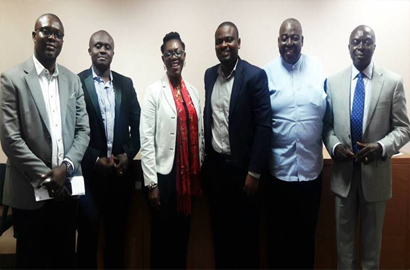By Nana Appiah Acquaye, Accra, Ghana
Ghana’s Minister of Communications, Ursula Owusu Ekuful, has urged the Broadband Communications Chamber (BBCC) to initiate public discussion on how to revamp the country’s five-year-old broadband policy to give proper direction to the digital Ghana agenda.
According to the Minister, it’s about time the country’s main ICT industry policies – specifically the 2012 National Broadband Policy and Implementation Strategy and the Telecoms Policy which do not appear to be relevant to the time is revised and brought in tune with current trends – to enable government to successfully embark on a national digitisation drive dubbed ‘It’s digi-time in Ghana’.
Mrs. Owusu-Ekuful gave the charge when the leadership of the Broadband Communications Chamber, led by its Chairman Dr. Yaw Akoto and Chief Executive Gustav Tamakloe, called on her to introduce the chamber formally.
The Communications Minister therefore asked the BBCC to start regular industry forums that will generate the needed insights for the review of the national policy to serve as a relevant guide for the digital Ghana agenda, and further expressed her intention to spread broadband connectivity nationwide, particularly to tourist destinations mainly located in deprived communities that lack broadband connectivity.
Chief Executive Officer of the Broadband Communications Chamber, Gustav Tamakloe, who welcomed the Minister’s profound suggestion said consolidation and alliance within the industry is the way to go and the players are willing to go that direction, but the policies and the regulatory framework do not exist for that to happen smoothly.
“That is one key area we will be looking at in our series of broadband forums,” he said.
Mr. Tamakloe noted for instance, that the policy needs to state clearly how to measure and report on the country’s broadband status because that is good for investor decisions.
He then stated that the annual Broadband Forum series would primarily engage industry players including policy makers, regulators, operators, content providers, consultants and other stakeholders in frank discussions about what direction the country’s ICT development should be going.
“We believe the focus should be on how to strengthen and mainstream local players because they are more likely to develop country-specific services and initiatives that will propel the country to achieve it development goals,” he said.
The BBCC boss said the Chamber would also be focusing on challenging the young content makers through app and ICT product/service development competition that would afford participants the opportunity to popularize their apps through the platforms of all BBCC member organizations.
Currently the members of BBCC are the three BWAs – Surfline, MainOne, Blu and Broadband Home plus K-Net; and steps are underway to bring in Google, MainOne, Nokia, Huawei, all ISPs and even telcos and wireless applications service providers.
Industry players have pointed out that the broadband policy, for instance, does not capture Broadband Wireless Access (BWA) operations, Wireless Applications Services and other key emerging technologies, and it does not also address the issue of consolidations, which has started happening in the industry.
The broadband policy does not even mention 4G LTE and yet that technology is here and the world is already moving on the 5G.
The telecom operators have also pointed out that the key targets in the telecoms policy have long been met and so the policy has long become irrelevant. They mentioned the voice and data subscriber base targets for instance, which were met years before the deadline.
So it has become necessary for a complete overhaul of the policies, and possibly to consolidate them into one unified policy as government seeks to pursue one national ICT agenda.
